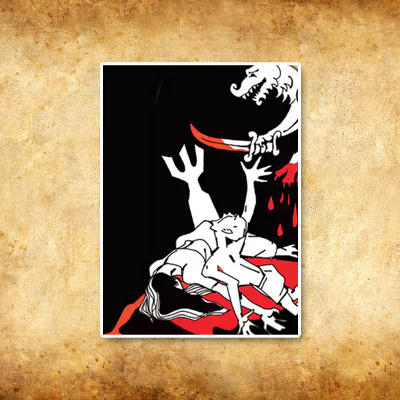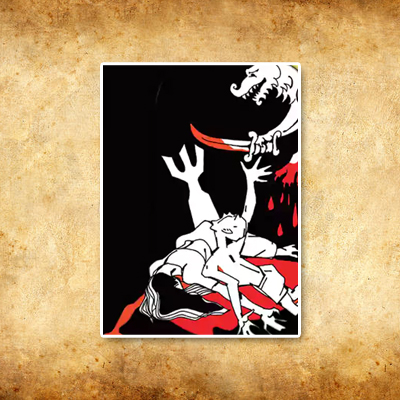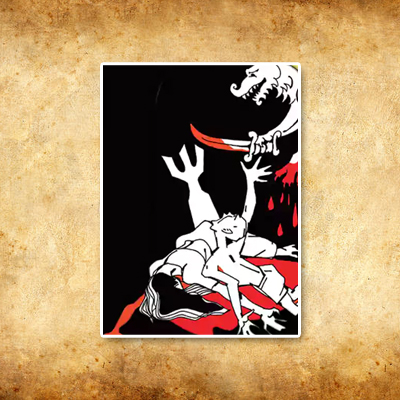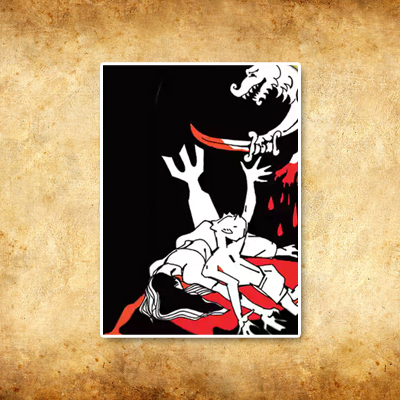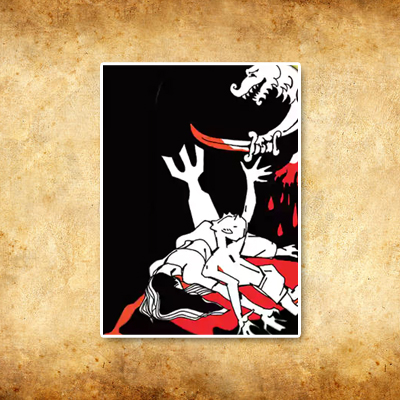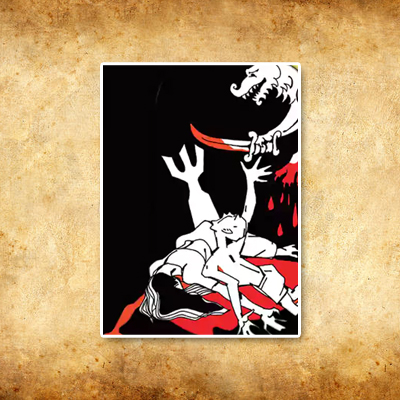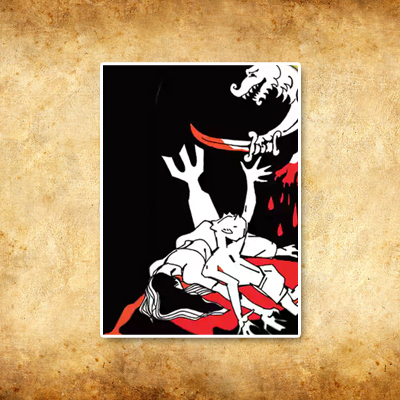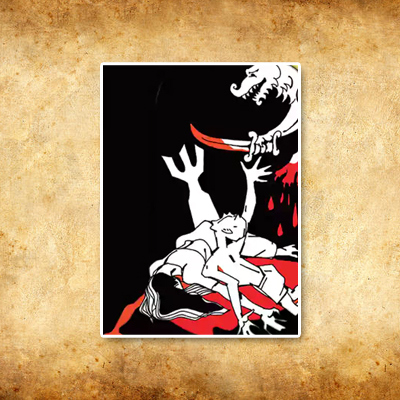1983ஆம் ஆண்டு இனப்படுகொலை – Black July (கறுப்பு யூலை)
1983ம் ஆண்டு மே மாதம் பதினெட்டாம் திகதி வட மாகாணத்திலுள்ள உள்ளூராட்சிச் சபைகளுக்கான தேர்தல் நடைபெற்றது. யாழ்ப்பாணம் மாநகரசபை, வல்வெட்டித்துறை நகரசபை, பருத்தித்துறை நகரசபை, சாவகச்சேரி நகரசபை ஆகிய நான்கு உள்ளூராட்சிச் சபைகளுக்கும் தேர்தல் நடைபெற்றது. இந்தத் தேர்தலில் தமிழர் விடுதலைக் கூட்டணியினரும் போட்டியிட்டார்கள். இந்த உள்ளூராட்சிச் சபைத் தேர்தலைப் புறக்கணிக்கும் படி தமிழீழ விடுதலைப் புலிகள் கேட்டனர். அவர்களுடைய புறக்கணிப்பு மிகதத் திவிரமாக இடம்பெற்றது. மறுபக்கத்தில் தமிழர் விடுதலைக் கூட்டணியின் அப்போதைய தலைவர்களும் தீவிரமாகத் தேர்தல் பரப்புரையில் ஈடுபட்டார்கள். தேர்தற் புறக்கணிப்பு 98% வெற்றிபெற்றது. இதைத்தெடர்ந்து அப்போதைய ஜே.ஆர் ஜெயவர்த்தனாவுடைய அரசாங்கம் தமிழ்ப் பிரதேசங்களில் ஏற்பட்ட தலைமைத்துவ மாற்றத்தால் அதிர்ச்சியடைந்தது. தமிழ் பேசும் மக்கள் நாடாளுமன்ற மிதவாத அரசியற் தலைமையை நிராகரித்து தமிழ் தேசியவாதத்தை முழுமையாக நேசிக்கின்ற ஓர் தலைமைத்துவத்தை தெரிந்தெடுத்தமை சிங்கள ஆட்சியாளர்களுக்கு அதிர்ச்சி வைத்தியமாகவே இருந்தது. இதனால் ஜே.ஆர். ஜெயவர்த்தனா கறுப்புக் குடைகளைக் கண்டு மிரளும் கட்டாக்காலி மாடுகளைப் போல மிரண்டார்.
தனது படைகளைக் கட்டவிழ்த்துவிட அவர்கள் கந்தர்மடம் பகுதிகளில் வீடுகளை எரித்தனர். பொதுமக்கள் தாக்கப்பட்டார்கள். அவர்களது சொத்துக்கள் சூறையாடப்பட்டன. யாழ்ப்பாணத்தில் ஓர் பதட்டமான சூழ்நிலை உருவாகியது. இந்தச் சம்பவங்கள் விரிவுபெற்று வவுனியாவிற்கும் பரவியது. அங்கும் கடைகள் எரிக்கப்பட்டன. இது பின்னர் திருகோணமலைக்கும் பரவியது. 1983ம் ஆண்டு யூன் மாதம் முழுவதும் ஒவ்வொரு நாளும் திருமலையில் எங்கோ ஒரு தமிழ்க் கிராமத்தில் தமிழ் மகன் சிங்களவரால் வெட்டிப் படுகொலை செய்யப்படுகின்ற நிகழ்ச்சி மிகவும் சர்வசாதாரணமாக நிகழ்ந்துகொண்டிருந்தது. இந்நிலையில் திருகோணமலைப் படுகொலைக்கு எதிராக 1983ஆம் ஆண்டு யூலை மாதம் 01ம் திகதி தமிழீழ விடுதலை அணி, யாழ்ப்பாண பல்கலைக்கழக மாணவர் ஒன்றியம் உள்ளிட்ட ஆறு அமைப்புக்களால் கடையடைப்பு முழு அளவில் நடத்தப்பட்டன. இந்தக் கடையடைப்பு நடைபெற்ற தினத்தன்று மாலை இரண்டு மணியளவில் கொழும்பிலிருந்து யாழ்ப்பாணத்திற்கு வந்த யாழ்தேவி தொடருந்து கோண்டாவிலில் வைத்து சில தீவிரப் போக்குடைய இளைஞர்களால் தீ மூட்டி எரிக்கப்பட்டது. இதைத் தொடர்ந்து இந்தக் கதவடைப்பை ஒழுங்குபடுத்திய வைத்திய கலாநிதி எஸ்.ஏ.தர்மலிங்கம் அவர்களும் சுதந்திரன் நாளேட்டின் ஆசிரியர் கோவை மகேசன் அவர்களும் யாழ்ப்பாணம் காவற்றுறையினராற் கைது செய்யப்பட்டு கொழும்புக்கு அழைத்துச் செல்லப்பட்டார்கள். அவர்கள் இருவரும் வெலிக்கடைச் சிறைச்சாலையில் சிறை வைக்கப்பட்டார்கள். இதனால் யாழ்ப்பாணத்தில் பதட்டம் ஏற்பட்டது. இதைத் தொடர்ந்து யாழ்ப்பாணத்திலிருந்து வெளிவந்த சுதந்திரன் தமிழ் நாளேடும் மற்றும் சற்றடே றிவியூ (Saturday Review) ஆங்கில நாளேடும் இலங்கை அரசினால் தடைசெய்யப்பட்டன. அந்த அச்சகங்கள் சீல் வைத்துப் பூட்டப்பட்டன.
அதே ஆண்டு யூலை மாதம் இருபத்து மூன்றாம் திகதி திருநெல்வேலியில் இடம்பெற்ற கண்ணிவெடித் தாக்குதல் ஒன்றின்போது பதின்மூன்று இராணுவத்தினர் கொல்லப்பட்டனர். இதை ஜே.ஆர். ஜெயவர்த்தனாவுடைய அரசாங்கம் இலத்திரனியல் ஊடகங்களுக்கு ஊடாக தீவிரமாகப் பரப்புரை செய்தது. தமிழ்ப் புலிகள் பதின்மூன்று சிங்கள பௌத்த இராணுவத்தினரை யாழ்ப்பாணத்தில் கொன்று விட்டார்கள் என ஜே.ஆர் இனவாதப் பரப்புரையைத் தூண்டிவிட்டார். இறந்த இராணுவத்தினரது உடல்களை யாழ்ப்பாணத்திலேயே அடக்கம் செய்துவிட இராணுவத்தினர் விரும்பியபோதும் அப்போதைய வர்த்தக அமைச்சர் அத்துலத் முதலியும் ஜே.ஆரும் அந்தப் பதின்மூன்று இராணுவத்தினரதும் உடல்களை கொழும்புக்கு எடுத்து வந்து சிங்கள மக்கள் மத்தியில் காட்சிப்படுத்திய பின்னர் பொறளை கனத்தை மயானத்தில் அடக்கம் செய்ய விரும்பினார்கள். இறந்த பதின்மூன்று இராணுவ சிப்பாய்களையும் கனத்தையில் அடக்கம் செய்யப்படும் என்று ஜே.ஆர் அரசு மிகப்பெரும் அளவில் விளம்பரப்படுத்தியதால் கனத்தையில் பல ஆயிரக்கணக்கான சிங்கள இனவாதிகள் குழுமினார்கள்.
இருபத்துநான்காம் திகதி மாலையே பொறளையில் இருந்த சைவ உணவகம் ஒன்று தாக்கப்பட்டது. அன்று இரவு இக்கலவரம் மருதானை, கொட்டாஞ்சேனை, வத்தளை, நீர்கொழும்பு எனப் பரவியது. மறுநாள் யூலை இருபத்தைந்தாம் திகதி இச் சம்பவம் மேலும் விசாலிப்படைந்தது. கொள்ளுப்பிட்டி, பம்பலப்பிட்டி, கொம்பனித்தெரு, வெள்ளவத்தை, தெகிவளை, மொறட்டுவ, பாணந்துறை என கொழும்பின் தமிழர்கள் வாழும் எல்லாப் பகுதிகளுக்கும் காட்டுத்தீ போல் பரவியது. இதனால் இரண்டு நாட்களில் கொழும்பில் வாழ்ந்த பல இலட்சக்கணக்கான தமிழர்கள் அகதிகளாக்கப்பட்டனர். இதனால் பம்பலப்பிட்டி சென். பீற்றர்ஸ் கல்லூரி, பம்பலப்பிட்டி இந்துக்கல்லூரி எனப் பல பாடசாலைகளில் இலட்சக் கணக்கான தமிழர்களுக்காக அகதி முகாம்கள் திறக்கப்பட்டன.
வெலிக்கடை சிறைச்சாலைப் படுகொலைகள்.
 இக்கால கட்டத்தில் வெலிக்கடையில் ரெலோ இயக்கத்தின் மிக முக்கியமான தலைவர்களான குட்டிமணி, தங்கத்துரை, தேவன், ஜெகன் மற்றும் வவுனியா காந்திய இயக்கத்தைச் சேர்ந்த வைத்தியர் இராஜசுந்தரம் போன்றவர்களும் இங்கு சிறைவைக்கப்பட்டிருந்தனர். குட்டிமணி, தங்கத்துரை போன்றவர்கள் கொழும்பு மேல் நீதிமன்றத்தில் நடைபெற்ற வழக்கின்போது ஆற்றிய உரை நாளேடுகளில் பிரசுரிக்கப்பட்டபோது, அது ஜனாதிபதி ஜே.ஆர், அத்துலத்முதலி, காமினி திஸாநாயக்கா, சிறில் மத்தியூ போன்ற அமைச்சர்களுக்குப் பெரும் ஆத்திரத்தையும் ஆவேசத்தையும் கிளறியது. இதனால் சிறைச்சாலையில் வைத்து இவர்களது உயிருக்குத் தீங்கு விளைவிக்கும் திட்டமும் போடப்பட்டது. இதற்கென கொலை, கொள்ளை போன்ற குற்றங்களுக்காக நீதிமன்றத்தில் தண்டனை விதிக்கப்பட கொலைகாரப்படை ஒன்று தயார் நிலையில் வைக்கப்பட்டிருந்தது. இந்தக் கொலைகாரப் படைக்குத் தாய்லாந்து விமானத்தைக் கடத்திச் சிறைத்தண்டனை விதிக்கப்பட்ட சேபால ஏக்கநாயக்கா தலைமை தாங்கினார். யூலை மாதம் இருபத்தைந்தாம் திகதி காலை வெலிக்கடைச் சிறைச்சாலைக்கு காமினி திசநாயக்காவும், அத்துலத்முதலியும் சென்று தமிழ்ச் சிறைக் கைதிகளைக் கொள்ளுமாறு பச்சைக்கொடி காட்டிவிட்டுச் சென்றார்கள். அன்று மாலையே குட்டிமணி, தங்கத்துரை, ஜெகன் உள்ளிட்ட முப்பத்தைந்து தமிழ்க் கைதிகள் கொல்லப்பட்டனர். அவர்களைக் காப்பாற்றவோ, கொலை வெறியர்களான சிங்களக் கைதிகளைத் தடுக்கவோ சிறைச்சாலை நிர்வாகம் எந்த நடவடிக்கையும் எடுக்கவில்லை. இதன் விளைவாக யூலை மாதம் இருபத்தேழாம் திகதி மேலும் பதினேழு சிறைக்கைதிகள் கொல்லப்பட்டனர். மொத்தமாக இரு தினங்களிலும் வெலிக்கடைச் சிறைச்சாலையில் சிறை வைக்கப்பட்டிருந்த ஐம்பத்திரண்டு சிறைக்ககைதிகள் அநியாயமாகப் படுகொலை செய்யப்பட்டனர்.
இக்கால கட்டத்தில் வெலிக்கடையில் ரெலோ இயக்கத்தின் மிக முக்கியமான தலைவர்களான குட்டிமணி, தங்கத்துரை, தேவன், ஜெகன் மற்றும் வவுனியா காந்திய இயக்கத்தைச் சேர்ந்த வைத்தியர் இராஜசுந்தரம் போன்றவர்களும் இங்கு சிறைவைக்கப்பட்டிருந்தனர். குட்டிமணி, தங்கத்துரை போன்றவர்கள் கொழும்பு மேல் நீதிமன்றத்தில் நடைபெற்ற வழக்கின்போது ஆற்றிய உரை நாளேடுகளில் பிரசுரிக்கப்பட்டபோது, அது ஜனாதிபதி ஜே.ஆர், அத்துலத்முதலி, காமினி திஸாநாயக்கா, சிறில் மத்தியூ போன்ற அமைச்சர்களுக்குப் பெரும் ஆத்திரத்தையும் ஆவேசத்தையும் கிளறியது. இதனால் சிறைச்சாலையில் வைத்து இவர்களது உயிருக்குத் தீங்கு விளைவிக்கும் திட்டமும் போடப்பட்டது. இதற்கென கொலை, கொள்ளை போன்ற குற்றங்களுக்காக நீதிமன்றத்தில் தண்டனை விதிக்கப்பட கொலைகாரப்படை ஒன்று தயார் நிலையில் வைக்கப்பட்டிருந்தது. இந்தக் கொலைகாரப் படைக்குத் தாய்லாந்து விமானத்தைக் கடத்திச் சிறைத்தண்டனை விதிக்கப்பட்ட சேபால ஏக்கநாயக்கா தலைமை தாங்கினார். யூலை மாதம் இருபத்தைந்தாம் திகதி காலை வெலிக்கடைச் சிறைச்சாலைக்கு காமினி திசநாயக்காவும், அத்துலத்முதலியும் சென்று தமிழ்ச் சிறைக் கைதிகளைக் கொள்ளுமாறு பச்சைக்கொடி காட்டிவிட்டுச் சென்றார்கள். அன்று மாலையே குட்டிமணி, தங்கத்துரை, ஜெகன் உள்ளிட்ட முப்பத்தைந்து தமிழ்க் கைதிகள் கொல்லப்பட்டனர். அவர்களைக் காப்பாற்றவோ, கொலை வெறியர்களான சிங்களக் கைதிகளைத் தடுக்கவோ சிறைச்சாலை நிர்வாகம் எந்த நடவடிக்கையும் எடுக்கவில்லை. இதன் விளைவாக யூலை மாதம் இருபத்தேழாம் திகதி மேலும் பதினேழு சிறைக்கைதிகள் கொல்லப்பட்டனர். மொத்தமாக இரு தினங்களிலும் வெலிக்கடைச் சிறைச்சாலையில் சிறை வைக்கப்பட்டிருந்த ஐம்பத்திரண்டு சிறைக்ககைதிகள் அநியாயமாகப் படுகொலை செய்யப்பட்டனர்.
இதற்கு முன்பாக யூலை மாதம் இருபத்துநான்காம் திகதி திருநெல்வேலி, கந்தர்மடம் போன்ற இடங்களில் ஐம்பத்தொரு அப்பாவிப் பொதுமக்கள் சிங்கள இராணுவத்தால் படுகொலை செய்யப்பட்டனர். இவர்களில் கல்விமான் கலா.பரமேஸ்வரன், ; அவரது மாமனார் சரவணமுத்து ஆகியோரும் உள்ளடங்குவர். இதைவிட நாடுபூராகவும் வெடித்த இச் சம்பவத்தில் மூவாயிரத்திற்கும் மேற்பட்ட தமிழ்ப் பொதுமக்கள் வெட்டியும், சுட்டும் படுகொலை செய்யப்பட்டார்கள். பல ஆயிரக் கணக்கான தமிழர்கள் காடையர்களுடைய தாக்குதலுக்கு இலக்காகி காயமடைந்தார்கள். தமிழ் மக்களுக்குச் சொந்தமான வீடுகள், கடைகள், கட்டடங்கள், வணிக நிலையங்கள் திரைப்பட அரங்குகள் தரைமட்டமாக்கப்பட்டன. தமிழர் சொத்துக்கள் கொள்ளையடிக்கப்பட்டன. கொழும்பில் பிரபல தொழிலதிபர் வை.ஏ.எஸ்.ஞானம், மகாராஜா நிறுவனம், கே.குணரட்ணம் எனப் பல நிறுவனங்கள் பெரும் பாதிப்புக்களுக்கு உள்ளாகின. ரேப்பியா என்ற நிறுவனம் இச் சம்பவத்தில் சுமார் பத்தாயிரம் கோடி ரூபாவிற்கு மேல் தமிழர்களுடைய சொத்துக்களுக்குச் சேதம் ஏற்படுத்தப்பட்டதென மதிப்பீடு செய்தது. இந்தச் சம்பவத்தின் போது ஜே.ஆர் ஜெயவர்த்தனா எதுவித நடவடிக்கையும் எடுக்கவில்லை. 1983ஆம் ஆண்டு யூலை மாதம் இருபத்தேழாம் திகதி ரூபவாகினி தொலைக்காட்சியில் தோன்றிய ஜே.ஆர் பாதிக்கபட்ட தமிழ் மக்களுக்கு எந்தவித அனுதாபமும் தெரிவிக்காமல் கடந்த சில நாட்களாக நடைபெற்ற அசம்பாவிதங்கள் சிங்கள மக்களது இயல்பான மன உணர்வுகள் எனக் கருத்து வெளியிட்டார். இதைத் தொடர்ந்து யூலை மாதம் இருபத்தொன்பதாம் திகதி ஒரு வெள்ளிக்கிழமை விடுதலைப் புலிகள் கொழும்புக்கு வந்துவிட்டார்கள் என்ற வதந்தி பரப்பப்பட்டது. அன்றைய தினம் மேலும் பல தமிழர்கள் கொல்லப்பட்டார்கள். கல்விமான் அருமைநாயகம் என்பவர் நுகேகொடையில் தனது வீட்டைப் பார்க்கப் போனபோது வெட்டிக் கொல்லப்பட்டார். கொழும்புப் புறக்கோட்டை காஸ்வேக்ஸ் ஸ்தாபனத்தில் வேலை செய்த தமிழ் இளைஞர்கள் பாதுகாப்புத் தேடி அந்நிறுவனத்தின் கூரைமீது இருந்தபோது அவ்வழியாக வந்த விமானப்படையினால் சுட்டு வீழ்த்தப்பட்டார்கள். இச் சம்பவத்தால் பாதிக்கப்பட்ட தமிழ் மக்களைக் காப்பாற்ற எந்த முயற்சியும் எடுக்காத ஜே.ஆர்ஜெயவர்த்தனாவுடைய அரசு 1983ஆம் ஆண்டு ஆவணி மாதம் நான்காம் திகதி இலங்கை நாடாளுமன்றத்தில் தமிழர் போராட்டத்தை நசுக்குவதற்காக 1978ஆம் ஆண்டின் அரசியல் யாப்புக்கான ஆறாவது திருத்தச் சட்டத்தைப் பாராளுமன்றத்தில் நிறைவேற்றியது. இதன்படி தனிநாடு கேட்டுப் போராடுதல், அதற்கு ஊக்கமளித்தல், உதவி செய்தல் என்பன போன்ற விடயங்கள் பாரதூரமான தண்டனைக்குரிய குற்றங்களாக அறிவிக்கப்பட்டன.
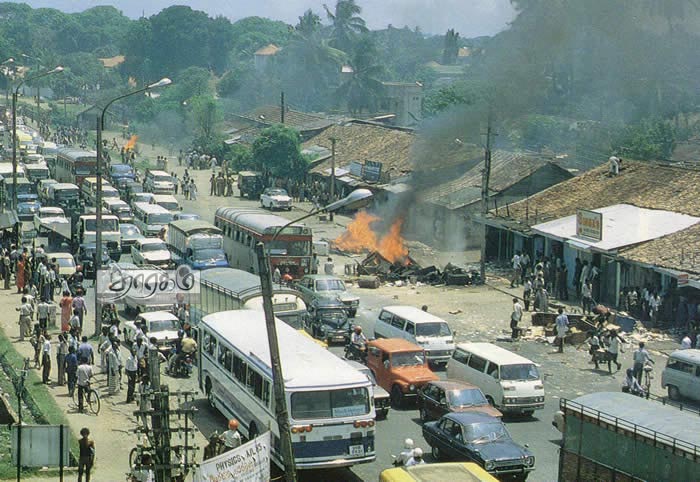

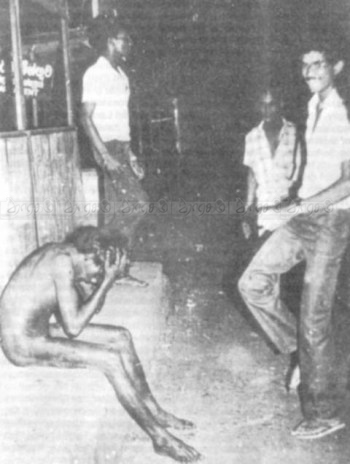
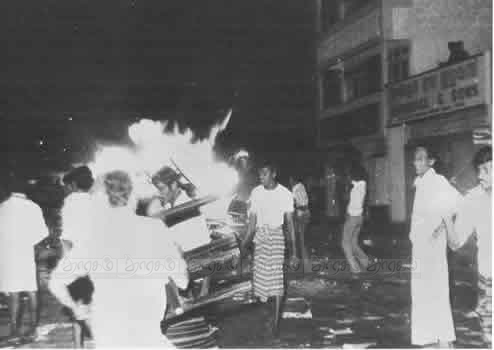
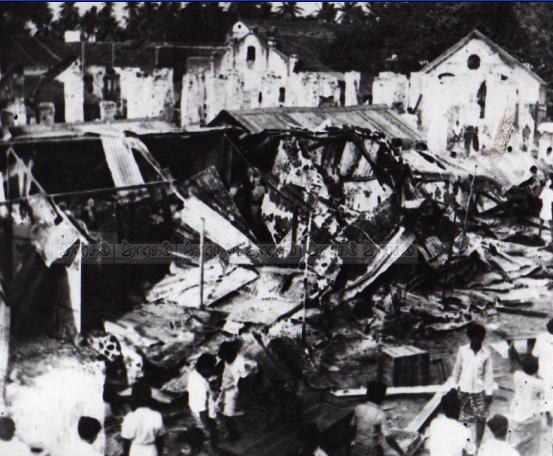
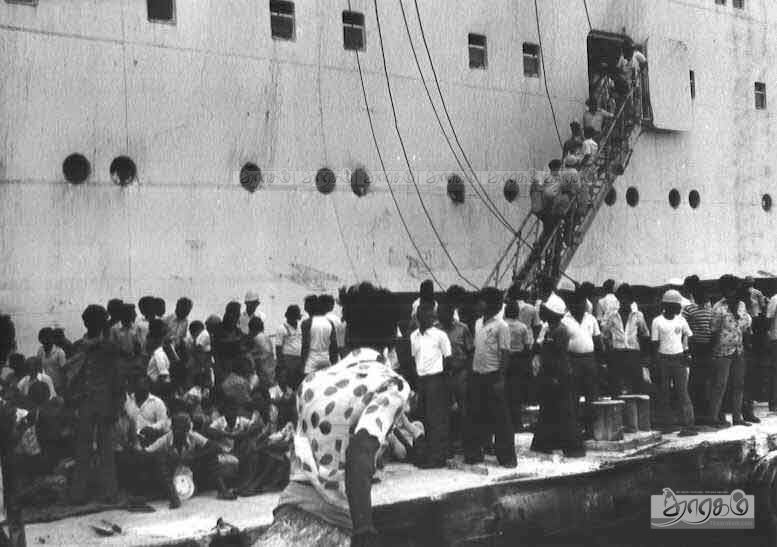
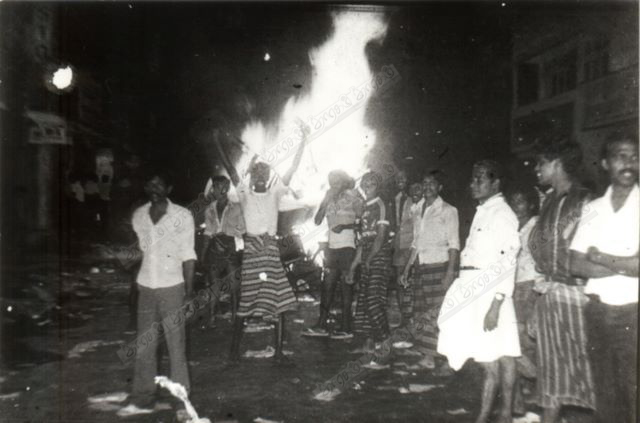
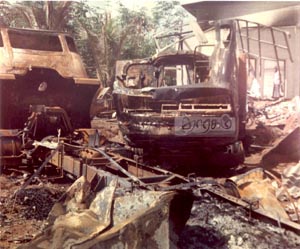 மூலம்: தமிழினப் படுகொலைகள் 1956 – 2001 நூல்.
மூலம்: தமிழினப் படுகொலைகள் 1956 – 2001 நூல்.


